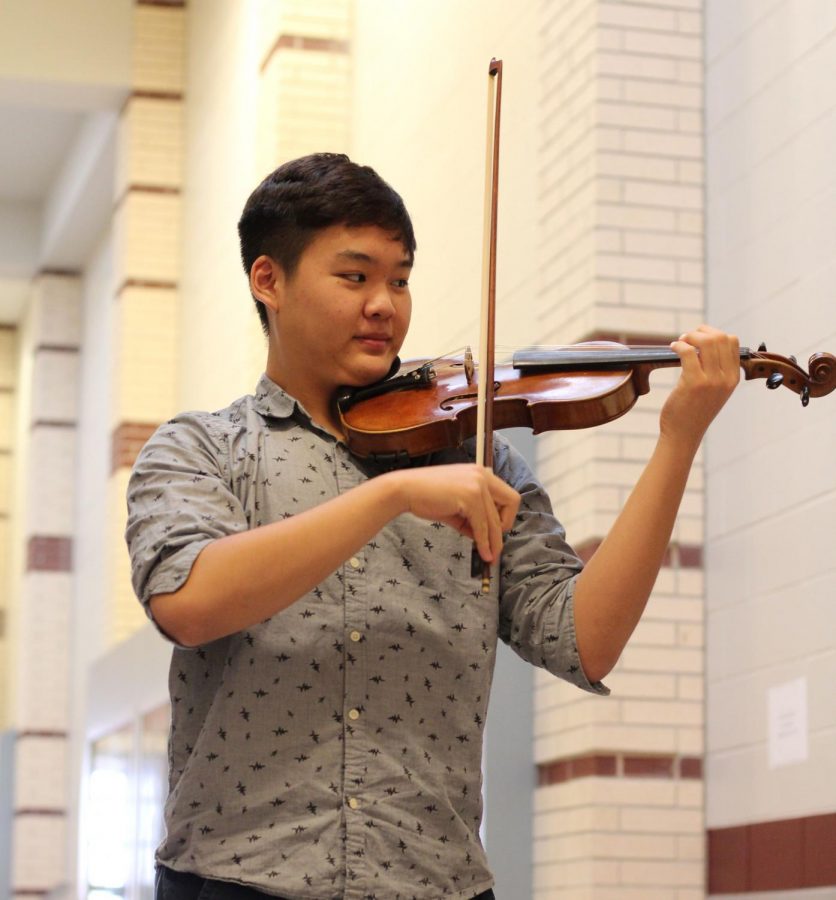A ‘Note’-able Feat
Junior Makes All-State Orchestra, Ranks First at Region
Junior Desheng Liu also plays in the Houston Youth Symphony.
November 18, 2019
Nearly 100 sets of eyes are on Desheng Liu as he walks up and sets his music on the stand. It’s not the many eyes that concern him, however, but the few sets of ears hidden from view behind a curtain, the judges who are waiting and ready to listen to his performance. He envisions not an audition, but a concert, where he is not an auditionee, but a soloist. He wipes the sweat from his hands off on his shorts and readjusts his violin. Taking three slow, long breaths, Liu hears his beat in his head, making sure not to begin before it steadies. And then, he begins to play.
Liu made first chair for the All-State Philharmonic Orchestra, ultimately ranking 41 among Texas’ top violinists. Liu also ranked first out of 186 violinists at Region auditions in early October. The audition pulled from students all across Region 23, which encompasses Katy ISD, Houston ISD, and Alief ISD, as well as numerous private schools.
“Even though I ranked first this year at Region I can’t get a big head about that,” Liu said. “I’m proud of what I got but I need to understand how there is always that competition. Region 23 is very competitive, there’s so many people who are crazy talented and hard-working. It’s tough, but the best way to improve and stay at that top level is to keep striving for more instead of settling where you are.”
The All-State process that encompasses Region auditions begins May 1, when two etudes (short pieces designed to develop a player’s technical skills) are released for each instrument. In July, the All-State excerpts are released, four short cuts for each instrument that come from pieces that the All-State Orchestras will eventually perform. Auditions are held in October, and the process concludes with a concert at the TMEA (Texas Music Educators Association) Convention in February. Out of over 68,000 students initially auditioning from bands, orchestras, and choirs, 1,780 are accepted to All-State.
“The amount of focus you put into this process is extremely tiring,” Liu said. “When the etudes come out in May, maybe the first two months are okay, but as you get into that middle slump during the summer you have to work hard to keep yourself motivated. Sometimes it’ll seem like you’re doing too much, too early, and then you can be going up and down from practicing to not wanting to practice.”
The Region audition, in early October, consists of playing two cuts, one from each of the etudes. Auditionees get preliminary cuts earlier in the fall, spots that the smaller audition cut will be pulled from, but do not find out the first audition cut until in their room moments before auditions begin. Students will go up to to a stand near the judges curtain, play their cut, and then return to their seats. They then get the cut from the other etude and repeat the process. Participants are hidden from the judges, but must perform in front of all the other auditionees. For violins, the largest group, the process can take over five hours.
“Region is this huge, chaotic competition,” Liu said. “There’s a fair amount of people who will just fool around, maybe that bottom 20% will go up and just play a single note or do something like Twinkle Twinkle Little Star or something. Then there’s that middle section where everyone tries and sounds somewhat good but all the same. You have to have this mindset to break out to be different and impress the judges; there’s nearly 200 people, so the best way to rank near the top is to make them remember you in a way that impresses them, whether that’s you have a really great tone or articulation or clarity.”
Region is independent from the rest of the All-State process. The next step, Area, is open to students whether or not they made region. However, it can pull from any part of the etudes and the All-State excerpts. The morning of the audition, eight tracks are released, two from each etude and one from each excerpt. At the audition, judges will ask for multiple tracks, usually one from each etude and at least one of the excerpt tracks. Those who make it return the next day to record themselves playing all eight tracks. This recording is submitted for the final All State judging process.
“Area is much more advanced,” Liu said. “More people are focused because it’s all about whether you can make all state or not. Since there’s less people and overall the bar is much higher, I think the thing you can do is just play the music clear and straightforward.”
Liu originally started playing the violin during the summer after fifth grade. He played piano beforehand for three years, but said he never practiced beyond when his parents told him too. His parents eventually let him quit piano, but said he would still have to pick an instrument to play, so he chose violin.
“Every year since I’ve started, I’ve significantly improved,” Liu said. “I think one of the biggest transitional periods was my freshman year; I was going from simple middle school music to more difficult high school music. There was also just so much music, from the Region etudes and All-State excerpts to the Region concert music itself. I learned how to manage my time a lot better from that. I also got a new private lesson teacher during that time, and that was great because he taught me how to practice better, instead of just telling me what to do. My practice got much more efficient after that.”
Despite his advancements, Liu says that the most important parts of being a good player remain the same no matter how long one has been playing or what their skill level is.
“There’s no special secret or advanced techniques to learn to be a good player,” Liu said. “The basics, like clarity, articulation, and intonation are still crucial to everything you do. You expand on them and develop them, but those three are still the most important components. For example, there’s that certain base level of intonation everyone has and develops after learning an instrument. There’s lots of small nuances in intonation beyond this though, and some people can’t hear that. During my transition from sophomore year to this year, I think I’ve definitely improved my perception and intonation. I never knew all the complexity and nuance that went into it. Working on just improving these fundamentals has really helped me grow as a player.”
This year, Liu said he faced a particular challenge balancing his time with schoolwork and studying for his SATs, but said he still worked as hard as he could to give it his all.
“Overall this process is crazy stressful, but it’s also incredibly rewarding,” Liu said. “For months you have to be performing well, and there’s lots of hard practicing and work. You have to keep your end goals in mind. You get so much benefit out of the process though; even if you don’t make it, you know you’ve improved as a player and you also have probably gotten a lot better at time management. This kind of competition is intense but I think it’s important to appreciate the challenge now when you might not have it in the future.”
Liu feels confident that despite having less time than last year, he performed as best as he could.
“That’s really all I can ask for,” Liu said. “As long as I truly feel I performed my best, I’m satisfied. Of course, even after playing so often, every single time I perform or audition, as I’m going up, I get nervous, I get a stomach ache, but I know that deep down I’m doing what I love. I like the nerves, and I like the competition of All-State. It might be really stressful but I remember that I love playing the violin and all this stems from that. The result, either way, is okay because it comes from that passion.”


